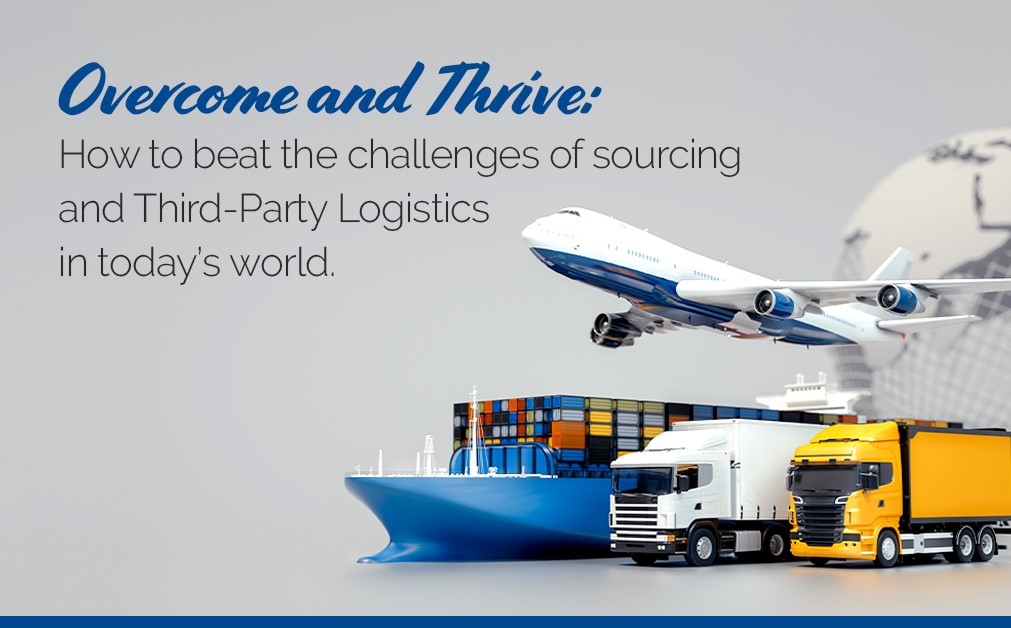Overcome and Thrive: How to beat the challenges of sourcing and Third-Party Logistics in today’s world.
Supply chain difficulties can cause a range of problems for businesses and in the worst cases can completely erode the bottom line.
The truth is any successful business will rely heavily on its supply network.
As many businesses will be all too aware, COVID19 has had a devastating effect on supply chains all across the world, and Australia has not been immune to these affects.
The ABS’ April 2021 ‘Business Conditions and Sentiments’ survey indicates around one quarter of respondents have made at least one change to suppliers or supply chains over the past year.
Managing your own product fulfilment and shipping may be a time-consuming and undesirable distraction from your primary business.
This is where Third-Party Logistics (3PL) can make a big difference.
Rather of devoting significant time and effort to arranging different suppliers, storing, packaging, and distributing items, and keeping track of stocks and delivery timelines, you may entrust these obligations to a company offering 3PL services, such as Pegasus Printing Group, a division of AAB Holdings.
In this article, we break down the benefits of 3PL services for businesses with specific references to how they can help you overcome the significant ongoing challenges posed by COVID19 in the global supply chain network.
What is Third-Party Logistics (3PL)
Third-party logistics (or 3PL) refers to the outsourcing of logistical procedures such as inventory management, warehousing, and fulfilment to a third-party company. With the tools and infrastructure to automate retail order fulfilment, 3PL providers enable ecommerce retailers and many other businesses to do more.
We don’t know who created the phrase “third-party logistics,” but businesses started outsourcing inbound and outbound logistics services to third parties in the 1970s and 1980s.
With the advent and rise of ecommerce in the 1990s and 2000s, the term 3PL has become commonplace, and 3PLs’ offerings have increased. Third-party logistics refers to the integration of warehouse operations and transportation services in the supply chain.
3PL is a growing industry in Australia and overseas, growth which is only expected to surge further with the rising challenges and disruptions associated with the global pandemic.
In fact, as of 2019, the worldwide 3PL industry was expected to rise to $1.3 trillion by 2024.
Those 2019 predictions certainly seem to be on track, according to fresh statistics from transportation and logistics firm SJ Consulting Group, which show that the COVID-19 pandemic fuelled tremendous growth for the world’s leading third-party logistics providers (3PLs), as it assisted in acquiring medicinal items from abroad and supported the stay-at-home shopping boom.
Why are 3PL services proving so popular during and now after the pandemic?
Because they help solve a lot of the problems businesses face in dealing with their supply chain.
What are the challenges businesses face with their supply chain operations?
Managing a supply chain is one of the most strenuous tasks in a business and it has been for a long time.
Sure, COVID19 and the flow-on effects from the global pandemic have not made things easier, but they have helped to exacerbate some of the problems commonly faced.
The main headaches that are often associated with supply chain operations include:
- Meeting ever-increasingly high consumer expectations
- Keeping expenses under control, particularly those associated with transportation Risk identification and mitigation
- Increasing visibility of the supply chain
- Developing and sustaining ties with suppliers and partners
- Keeping up with technological advancements
- Serving international markets
Whilst the top two challenges apply across the board, the last four can be particularly tough on smaller businesses.
This is mostly due to a lack of investing power, as well as the restricted availability of supply chain expertise, which, in times of seeming scarcity, tends to gravitate towards bigger firms with the ability to reward at the highest rates.
But first, let’s take a look at each of the previous four obstacles in turn, before quickly discussing why money and personnel offer issues of their own, making it more difficult to overcome the other challenges stated above.
How Can Utilising a Third-Party Logistics Company Solve These Supply Chain Challenges?
The third-party logistics (3PL) or third-party logistics firms manage the supply chain for global shipping and transportation of goods shipments. The benefits of engaging a 3PL firm can be game-changing for many businesses, in particular smaller and start-up businesses.
Whilst these businesses might feel like they can’t afford or are too small to access such services, they may just find that 3PL services are more accessible and deliver far greater benefits than they would have otherwise thought.
Some of the ways that 3PL companies can assist businesses of all sizes with the challenges that come with managing a supply chain include:
1. Drive cost-cutting measures
Managing logistics costs has never been more crucial, especially in these times of economic uncertainty. Capacity is constrained, and many shippers are facing increased prices while vying for a dwindling pool of carriers. In September, for example, the spot rate market for flatbed and refrigerated trucking reached $4.17 per kilometre, the highest level since 2018.
An experienced 3PL with a comprehensive suite of services can assist in identifying cost-effective and efficient solutions, warehousing costs being one of many.
2. Maintain shipping timeliness
According to McKinsey, transportation volumes increased by about 30% in early 2020 as a result of pandemic panic purchasing. Because of the limited capacity market, not only will prices rise, but there may also be delays as companies compete to get items out the door.
A third-party logistics (3PL) supplier may supply capacity, specialised equipment, and a complete variety of modes to keep operations operating smoothly.
Technology also plays an important role in overall efficiency, as the 3PL partner can follow loads in real-time and acquire improved freight management.
3. Adhere to best practices to maintain peace of mind.
Supply chain management necessitates a steady stream of split-second choices, particularly in a dynamic setting such as the COVID-19 issue. A dependable 3PL partner offers hands-on assistance and knowledgeable partners to assist firms in making critical choices swiftly and confidently.
How Can You Save Time and Money Using a Third-Party Logistics Provider?
Think about this for a second.
Out of all the Fortune 500 companies, 86% are using 3PL companies.
Furthermore, 96 of the Fortune 100 companies use 3PL solutions in conducting their business.
In Australia, the supply chain has been remodelled as a result of shifting business dynamics and the advent of global 3PLs. Outsourcing has become more popular in Australia, with a CAGR of more than 8% predicted for the projected period of 2020-2025.
The fact that hundreds of firms use third-party logistics providers, or 3PLs, attests to the efficiency and usefulness of their services. However, many medium-sized businesses worry if a 3PL is genuinely beneficial on a smaller scale. The reality is that 3PL services can assist companies of all sizes and are a wonderful method for a company to flourish.
Here are just some of the ways a 3PL company can help create new efficiencies and growth for your business:
Access Expertise Instantly
Outsourcing to a third-party logistics company entails assembling a team of supply chain experts. You don’t lose time or money negotiating the complexities of shipping operations. The third-party logistics provider (third-party logistics provider) manages your company’s inventory, delivery, and returns. That move enables you to strike the ground running right away by using their abilities and expertise.
Access Latest Technology
If you opt to handle your shipment in-house, you will have to purchase and instal an IT platform on your own. That’s an additional platform to understand and maintain, as well as monitor for updates, troubleshoot, and interact with clients.
What happens if such an important system fails or fails to update your inventory correctly? How would you deal with such a risk?
You assign system administration to a business that specialises in such platforms by outsourcing these services to a 3PL. Shipping is not all that the 3PL does. Managing relevant IT procedures is just a part of their day-to-day operations, enabling you to delegate this job to the professionals.
Flexibility & Scalability
You can scale the services you need, which is very useful if your organisation has seasonal fluctuations (like more orders around holidays.) When your inventory is low, you might cut down on services and cut expenditures. When your inventory grows, you may still use the 3PL service provided by your supplier without incurring significant costs.
When orders have stalled or you’re revamping a product and getting ready to re-launch, flexibility is very useful. This is a better choice than building and maintaining your own warehouse and employees, which may result in losses during slower seasons.
As a third-party logistics company, Pegasus Print Group can help with managing the supply chain process. We have a team of professionals who can take on new projects quickly and efficiently while staying on top of logistics and project deadlines.
With our knowledge and experience in this field, we work with manufacturers, distributors, retailers, and consumers. We also offer transportation services for goods from one location to another as well as warehousing services, as part of the AAB Holdings Group.
Don’t wait any longer to get started, contact our team now, who can advise you on the best way to manage your supply chains moving forward. Call 0414 265 521 or email: sales@sos.com.au




